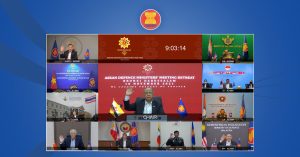Yesterday, the media outlet Myanmar Now reported that Myanmar’s military junta has been invited to a five-day regional meeting on maritime security co-hosted by Thailand and the United States.
The ASEAN Defence Ministers’ Meeting (ADMM)-Plus Experts’ Working Group on Maritime Security will be held in Bangkok next month, and brings together the 10 member states of the Association of Southeast Asian Nations (ASEAN) and its dialogue partners: Australia, China, India, Japan, New Zealand, Russia, South Korea, and the United States.
According to leaked meeting documents obtained by Myanmar Now, the meeting will include a tabletop exercise that will simulate three operational scenarios: search and rescue; piracy; and human trafficking and the smuggling of drugs and weapons.
This is not the first time since the coup that Myanmar has attended an ADMM, having participated in the ADMM-Plus in 2021 and the ADMM in June of last year. But the junta’s attendance at the meeting is nonetheless potentially embarrassing for the Western governments that have condemned the coup of February 2021 and its long catalog of recent atrocities.
This is particularly the case for the U.S. government, which last March formally accused the Myanmar military of genocide for its violent offensives against the Rohingya minority in the west of the country in 2017. The attacks, which were accompanied by killings, rape, and arson attacks on Rohingya villages, drove around 740,000 civilians across the border into Bangladesh, where most remain in a series of large refugee camps dotted around the town of Cox’s Bazar.
A Pentagon spokesperson told Reuters that the attendance is determined by ASEAN, and that U.S. policy toward Myanmar remains unchanged. “The United States continues to join the international community in responding forcefully to the military coup in Myanmar to urge the regime to end violence, release all those unjustly detained, and restore its path to democracy, to include through ADMM-Plus forums,” Lt. Col. Marty Meiners said.
The junta’s attendance at the ADMM-Plus meeting demonstrates the shortfalls of ASEAN’s current response to the military coup and the inflamed conflict that has followed in its wake. Since late 2021, the bloc has barred the military administration from participating in major ASEAN meetings for its failure to abide by ASEAN’s Five-Point Consensus peace plan, which calls for an end to violence and inclusive dialogue involving “all parties” to Myanmar’s conflict.
However, it has been inconsistent on the less widely publicized bread-and-butter working groups and meetings that make up the bulk of ASEAN’s annual schedule. In November, the junta’s Defense Minister Mya Tun Oo was excluded from an ADMM meeting for the first time. The same month, Indonesian President Joko Widodo proposed that the Myanmar military be banned from ASEAN meetings beyond its major summits, until it takes credible steps to implement the Five-Point Consensus. The exclusion of the junta from all ASEAN meetings would seem to be the organization’s next logical response to the junta’s obduracy, and is likely a position that Indonesia will advance as ASEAN chair in 2023.
In inviting the military junta to attend next month’s meeting, the Thai government seems to have broken with this policy, however informal and unannounced, reflecting its own controversially accommodative policy toward the military government next door. Last month, for instance, Thailand hosted an informal meeting to which it invited the junta’s foreign minister, Wunna Maung Lwin, who has been barred from attending meetings of ASEAN’s foreign ministers. Both of these moves have undermined any chance of a consensus settling around the more robust policy advocated by other ASEAN member states, including Indonesia and Malaysia.
ASEAN’s disunity over Myanmar not only guarantees that the bloc is ineffective in stopping the chaos engulfing one of its member states; it could also make some Western nations think twice before attending such ASEAN “Plus” forums.
Several Western nations, including Australia and the U.S., withdrew from ADMM-Plus meetings on counterterrorism co-hosted by Russia and the Myanmar military last year. This likely had as much to do with Russia’s involvement as with Myanmar’s, but were Australia, New Zealand, and the U.S. to reconsider their involvement in the ADMM-Plus forums, it could incrementally erode ASEAN’s prized position of “centrality” in the region’s diplomacy. If moral arguments about the suffering of the Myanmar people don’t bring the ASEAN-9 into alignment on the military junta, perhaps this will.

































